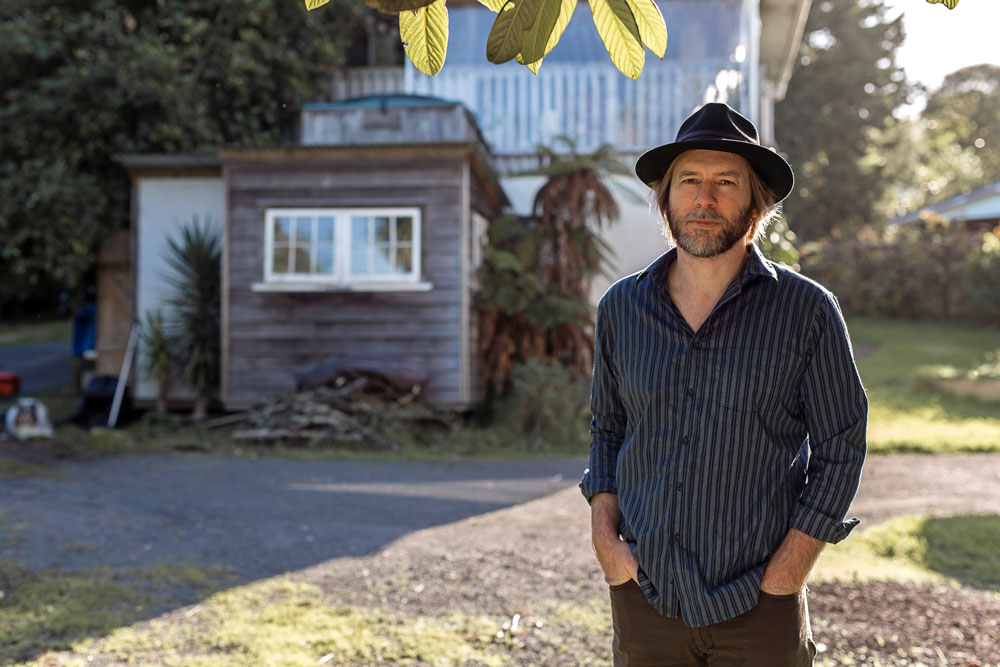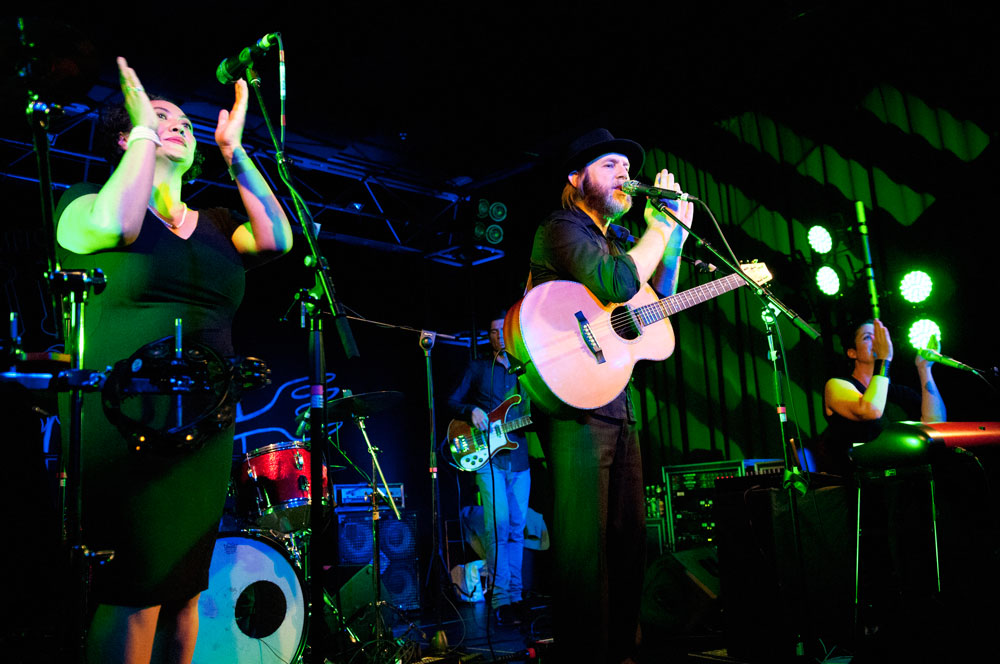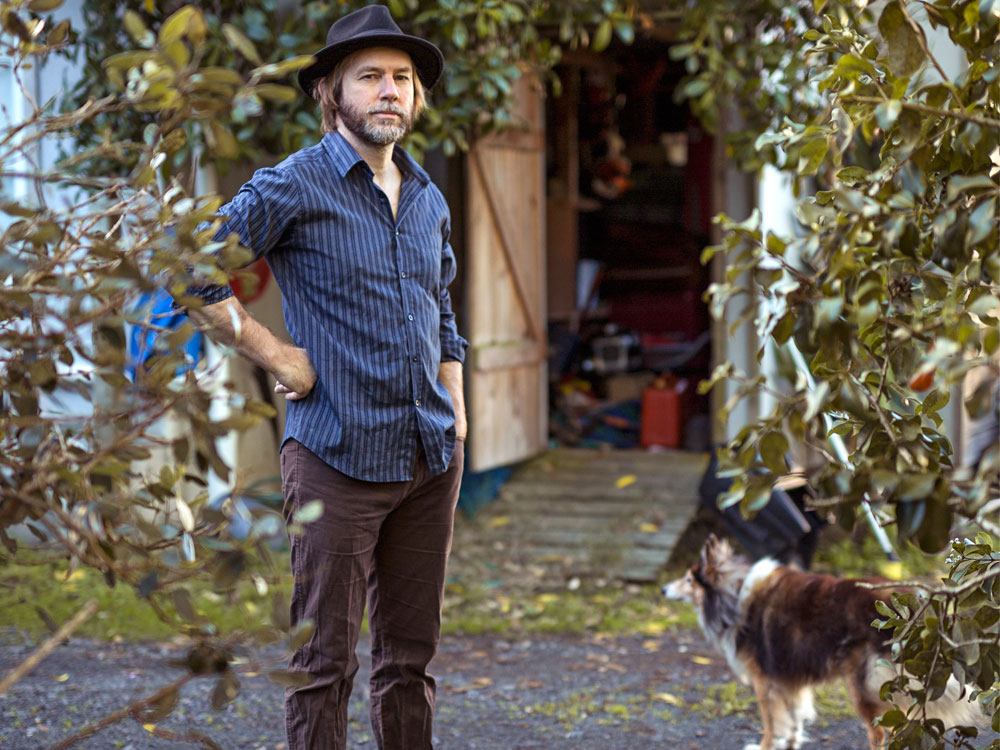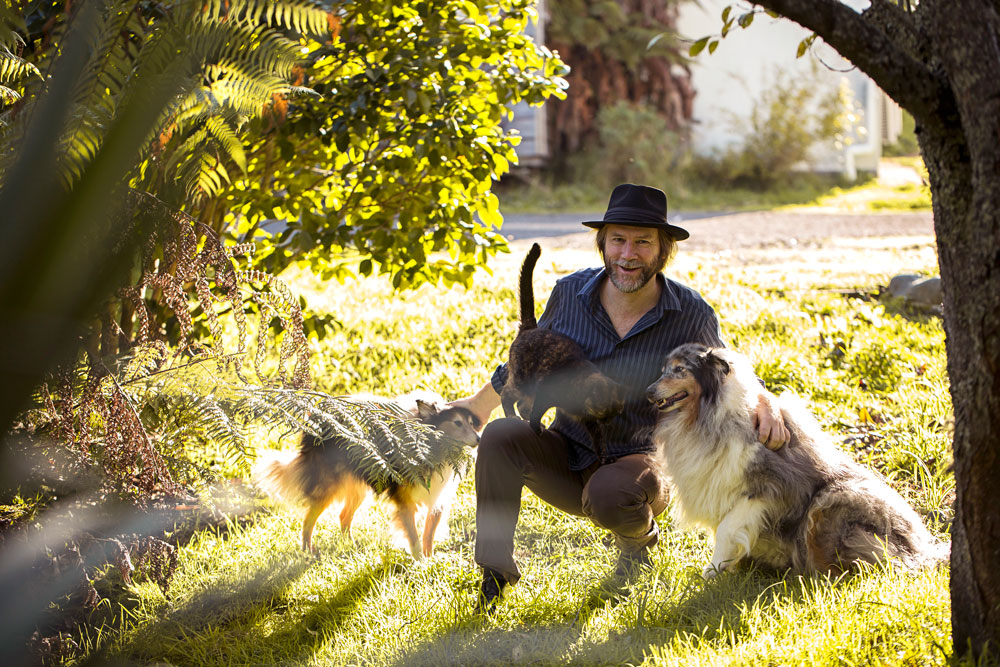Aug 13, 2015 Music
This story by Gary Steel first appeared in the July 2015 issue of Metro magazine. Photographs by Mark Barber.
Head out on Auckland’s Northwestern Motorway, and all roads lead to Helensville. That’s what it feels like, anyway, all those oversized signs beckoning you towards the ultimate destination.
What a swizz. Forty-eight kilometres and 40 minutes later, there it is: a motley collection of houses accommodating around 3000 inhabitants on a hill overlooking the mucky-brown water of the tidal Kaipara River as it snakes towards the harbour.
It’s a “could have been” town — a settler village formed on the kauri trade, with a harbour that could have rivalled the Waitemata had it not filled with sediment as Helensville’s pioneers denuded the hills of ancient forest, processed the wood and packed it off using the handy harbour tributaries. Ports of Auckland would surely have known what to do.
It’s a destination that — despite those misleading motorway signs — went pretty much undocumented in song until 2015, when SJD’s “Helensville” started beaming from the bFM playlist and trafficking through social media. Hey, if Glen Campbell can memorialise Galveston, why not Helensville?
In any case, it turns out that Helensville was fairly incidental in the gestation of the song. It just happened to fit the rhyme scheme and tenor of this overtly melancholy piece, where the narrator is left barefoot and abandoned in a rainy, grey-skied town far from the action.
Saint John Divine by SJD
[tps_title]Listen to Saint John Divine by SJD.[/tps_title]
Coincidentally, Helensville is my home, having moved here before the latest Auckland housing boom, but after property prices beat my hard-won mortgage deposit to a battered pulp. What better scheme, then, for Sean Donnelly, the man whose initials make up his project name SJD, to hit the road and follow those oversized signs to my town for an afternoon of exploration through the psycho-geography of the village and the psyche of the artist.

It’s a chance to ask some hard questions of Donnelly, unquestionably the most critically acclaimed New Zealand singer-songwriter of the 21st century, but who — despite the effusive commendations of supporters including legendary old-guard icons such as Neil Finn, Don McGlashan and Dave Dobbyn — still finds himself, after seven albums, an acquired taste and unknown to the filthy masses that have most of the music-purchasing power.
I want to know why he’s still lost in the margins, and whether that’s a symbol of some flaw in his music, or a flaw in the way the system and the public decide who to support.
I want to understand how the heck he’s kept it all going for so long, and what he really wants out of this “career”. I know it’s not going to be an easy task: Donnelly is a serious-minded character, and he’s notoriously difficult to draw out of himself.
It’s not raining today in Helensville, but it may as well be. Some seismic event has obviously occurred this morning in the Donnelly household and — despite his best efforts — I can smell moroseness. We lunch at a local cafe, where he rejects the focaccia as inedible, so we head for a walkway beside the river and past the sad, derelict remains of the local dairy company building, once the hub of the community and an export award-winner.
It feels strangely appropriate to snap pictures of a man who has often been accused of making melancholy music squinting in front of a fence designed to keep taggers and itinerants out of the premises, which have been left unloved since a series of Power Rangers was filmed there a couple of years back.
I figure it will take some time to get Donnelly in the mood to open up and talk, and it does. We’ve known each other since 1997, but he’s as guarded and nervous and self-conscious as if we’d just met.
It wasn’t long after I opened Beautiful Music — a store and venue specialising in experimental music of all persuasions — that I became friendly with Kieran Donnelly, an outgoing young artist with an easy smile and a way with woodcarving and interior design.
It was through Kieran that I met Sean, his brother, who immediately struck me as being chalk to Kieran’s cheese. Where Kieran was affable and physical and probed people like he really wanted to get to know them, Sean was withdrawn, seldom smiled and often stumbled over his words, a nervous affectation marking him out, I thought, as a mere shadow to his younger brother.
How wrong I was. Sean’s lack of affability simply betrayed his lack of interest in small talk. He reminded me of me, in his inability to forge quick social connections and distaste for discussing the weather or the latest match results. Sean had stuff to think about, and study, and there just wasn’t room for all that spurious faffing about.
He became a regular at my quaint music shop, propped up on a stool at the counter with a pair of Sennheiser headphones clamped to his head, auditioning a stack of obscure and probably mostly unlistenable CDs, some of which we would post-mortem in robust discussions.
I had no idea he even played an instrument, until one day I ended up at his then-flat above a shop at the very beginning of Mt Eden Rd. I had sold him my old turntable and he showed it to me perched on a shelf in his lonely-looking, utilitarian, windowless bedroom. Then he invited me down to the kitchen to hear him run through some songs, a singer-songwriter accompanying himself on acoustic guitar.
Such confronting performances are always, always uncomfortable. What if I thought it sucked? Would he punch me out or would he cry? Would he ever speak to me again? It was a short set of three or four songs and it was great. I hated the embarrassing situation, loved the music. I had no idea that Sean the Withdrawn was a talented singer-songwriter nobody had ever heard of.
I had no idea that Sean the Withdrawn was a talented singer-songwriter nobody had ever heard of.
Soon after, he dropped a CD into my shop. Believing it to be the same material, my jaw dropped when, late that night, I pressed the play button and on came six songs that were simply indescribable. Supposedly by The Delicious Food Band, there wasn’t an acoustic guitar to be heard. Instead, influenced by the electronic producer-nerds who had found a home at my shop, he’d fashioned his oddball grooves out of disparate samples. Everybody was doing it in 1997 but, proving that necessity is the mother of invention, Donnelly had coaxed some really arresting sounds out of his primitive PC.
It wasn’t so much the often awkward and meaningless cultural collision of sampled material, but his unusual choices (Georgian choirs, alluring world music, 70s spy-movie grooves and an “Oscillator”, a hypnotic guitar line backed by nothing more than backwards voices) that made it different. That, and his sophisticated sense of composition. Where so many sampladelic laptoppers lacked the fundamentals to write a tune, even Donnelly’s lesser pieces had some kind of dramatic development, some light and shade.
That private-press EP got a thrashing on my bFM show, The Parallel Universe, and in 1998 came an actual album, 3. It was also at my shop that Donnelly met the man who would sign him to Round Trip Mars, Stinky Jim (aka Jim Pinckney); now distributed by the New Zealand arm of Universal, it is still his label today.

RTM released 3 properly in 1999 and it made a buzz in the underground, but it was 2001’s Lost Soul Music that did it, with its novelty song “Tree People”, a groovy beat with pitch-shifted vocal lines that rhymed “desire” with “pants on fire”. Then came Southern Lights in 2004, still filled with great bachelor-pad grooves and an increasingly deft touch on his sonic electronic palette, but with critical acclaim for its single “Superman, You’re Crying”, an evocative ballad that even scraped into the national charts.
The first three SJD albums were a breakneck evolution, from instrumentally oriented, sample-based groove music, through to classic pop with an electronic twist, and over the next decade, every two or three years, Donnelly would break his silence with a new SJD record — and every time he wowed the critical elite and won more fans among our music royalty.
So, how has Donnelly maintained a career in music for 17 years, while remaining below a sales threshold that guarantees longevity?
Perhaps it’s something to do with being so well versed and immersed in the rich threads of pop history. His heroes are the best of the best, the connoisseur artists who, for the most part, never connected with the zeitgeist or the common punter, instead eliciting ecstatic epic reviews in rock publications, often followed by commercial suicide.
During our afternoon together, I sit Donnelly on my couch and give him the blindfold test on a selection of obscure pop and rock acts, and without a hitch, he guesses every single one of them within seconds, usually down to the album and track they came from. Astonishing.
While munching on a pineapple cream roll on my front porch, Donnelly slowly warms up to the inquisition. At first, he’s guarded, and minutes tick slowly by as he absorbs a question, says, “I’ll have to think about that,” and formulates an answer. Perhaps it’s the sugar, or the sun (he has said he suffers badly from seasonal affective disorder), or my nagging, but as we go on, his voice starts racing, and finally, he’s in the groove and unleashing his thoughts in torrents.
Donnelly is one of a small handful of New Zealand-based musicians who make a full-time living through music, though in his case it’s not his own albums, but the side projects and paid work — the radio and TV jingles, membership of Neil and Sharon Finn’s Pajama Club, work with Don McGlashan, membership of singing group The Bellbirds and, most recently, playing bass on Julia Deans’ Joni Mitchell tribute tour — that bring home the bacon.
But that body of work, the albums, are the reigning obsession, and each one represents a labour of love. In the case of his latest, Saint John Divine, it took seven months, working on songs that have been around for up to six years.
“The thing is,” he says, “you spend a ridiculous amount of time making an album, a ridiculous amount of time writing those songs, then waiting for it to be released… and [a couple of months later] it’s already done its dash. That’s the way it is. How do I continue to get it out to people? It’s just a real challenge, and I’m so not the right personality for doing that.”
Riven with the kind of insecurities that have plagued artists through the ages, Donnelly battles with the fact that he’s making art out of pop, a medium always susceptible to bubblegum. As a student of popular music, he still looks to find qualities in the plastic charade.
“Maybe [that kind of music] has an instant communication with others and puts them in a good frame of mind. And what else is music for? Why is music that is very searching and deep and detailed — like I imagine my music on better days to be — any better than music that is simple and toe-tapping and instantly puts someone in a better mood? Internally, I have reasons why I prefer the former, but maybe that’s just the kind of person I am. It sounds like I’m sitting on the fence, but I don’t think I am. It just helps me to accept my station in life a little more easily. It’s a niche product. It’s my brand.”
Donnelly bristles at my continuous harping on about him being a “connoisseur” artist, but agrees that he’s an audio sponge, soaking up through his refined sensibilities all the best bits of the past 40 years of popular music and regurgitating them in SJD fashion. “But if I’m thinking about it too much it’s no good; it just has to go through the mincer, and gets organically synthesised. When you hear something [you like] you just have a crack at it and it sounds like you just ripped it straight off. Then it goes down and starts fermenting. Fermentation is a really important process in music.”
As much as I’m a fan of SJD, and sat on the Taite Music Prize judging panel pushing for him to win the prize, I often feel a degree removed from his music. Like The Chills’ Martin Phillipps before him, SJD makes music that revolves around an aesthetic created largely by artists fucked up on drugs and often psychologically imperilled. Sometimes it feels more like a homage to that aesthetic than a direct line to the emotions pop music is supposed to express directly. If I have a problem with SJD, it’s that he’s too knowing, too aware, too conscious.
But while he agrees that he soaks it all up, he reckons that his process is largely intuitive. “A good song is by definition a happy accident. It’s the little thing that pops up when you’re painfully trying to craft something that’s been bugging you for six months. You might have one tiny little breakthrough and you sit down in exhaustion, and that’s when a real gem appears.”
“A good song is by definition a happy accident.”
While Donnelly’s early work was an intoxicating collision of disparate samples, he feels now that the work lacked honesty. I beg to differ, but the work did reflect a competitive, awkward and at times belligerent attempt to fit a scene. At one of the week-long electronic music festivals held at Beautiful Music, Donnelly proudly debuted a new work that seemed to consist of not much more than textural white noise. The assembled crowd ignored the pre-recorded set entirely, and continued to wait for the non-existent SJD gig.
He also launched Lost Soul Music at Beautiful Music with a listening party, where punters were asked to listen to a full playback of the album without talking. At all. Awkward.
But there’s a gratifying sense that, with Saint John Divine, Donnelly’s music has found its natural fit — and that seems to have been reflected in the album spending months hovering about the mid-regions of the New Zealand charts.
While Elastic Wasteland garnered the Taite Music Prize in 2013, and was pumped up with the raw emotions Donnelly was feeling at the time, its synthetic tones alienated people. Having become a valued member of Neil Finn’s inner circle, SJD now has a sound that’s rounded out into an old-fashioned organic rock/pop/folk amalgam. The songs have a more conventional arc, narrative and contour.
[tps_title]The music video for “Make Love Ask Questions” later from Elastic Wasteland.[/tps_title]
Donnelly agrees: “With a couple of exceptions they’re less innovative in terms of form, but they’re more songs, and that’s what I want to do for a while… write songs and have them come out as songs.”
Trying to define what he’s after, Donnelly offers beauty. “On the most shallow level, I love beauty in any form of the arts, but I have a wide definition of what beauty is. Sir Francis Bacon said, ‘There is no excellent beauty that hath not some strangeness in the proportion.’ There’s something weird about something that’s really beautiful, like the most beautiful-looking people always have something that’s so totally them. They’re beautiful in a way that’s totally them, that makes it a transcendent level of beauty. It’s the same with music. There’s a certain dissonance that makes it so much better.
“I worry about words like ‘connoisseur’ and ‘sophistication’ because it makes me think of things that are rarefied and that aren’t truthful. I want to make something that reflects the complexity but also the beauty of everyday life. Truth is very important, but the kind of truth that can reveal itself to my soul is something that somehow takes into account all the other complexities, is balanced by the other complexities of life. So true happiness or true joy in a piece of music has to be negotiated through the despair, the misery… the mundaneness and confusion of everyday life.”
Sean Donnelly — the aesthete and seeker of musical truth, whose music is a deft combination of the familiar and a deviation from accepted norms. Unsurprisingly, he harbours a deep dislike of the contemporary fascination with plasticity. “That whole pop culture Nazi thing, I really fucking hate. Those are people I have a distaste for, people who love something because it’s popular, because they’re interested in the zeitgeist and they’re interested in what people like en masse. I can tell you what people like en masse — they like anything they’re force-fed for any length of time. That’s what they like.”
It’s the story of the devolution of the cultural palate, and I can’t deny that his view has some truth to it. If nothing else, SJD’s modest success represents an attempt to kick against that poisonous paradigm.







